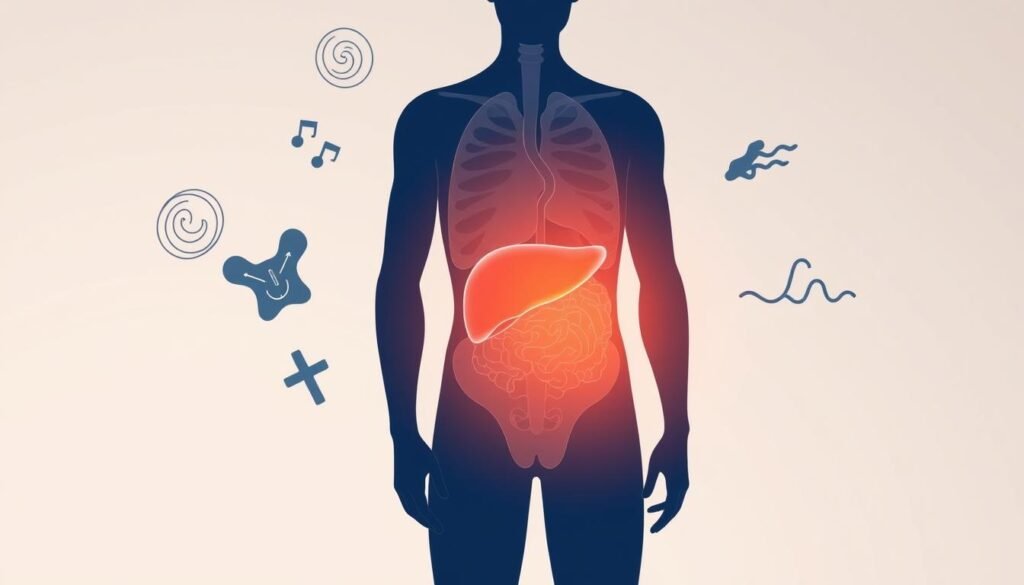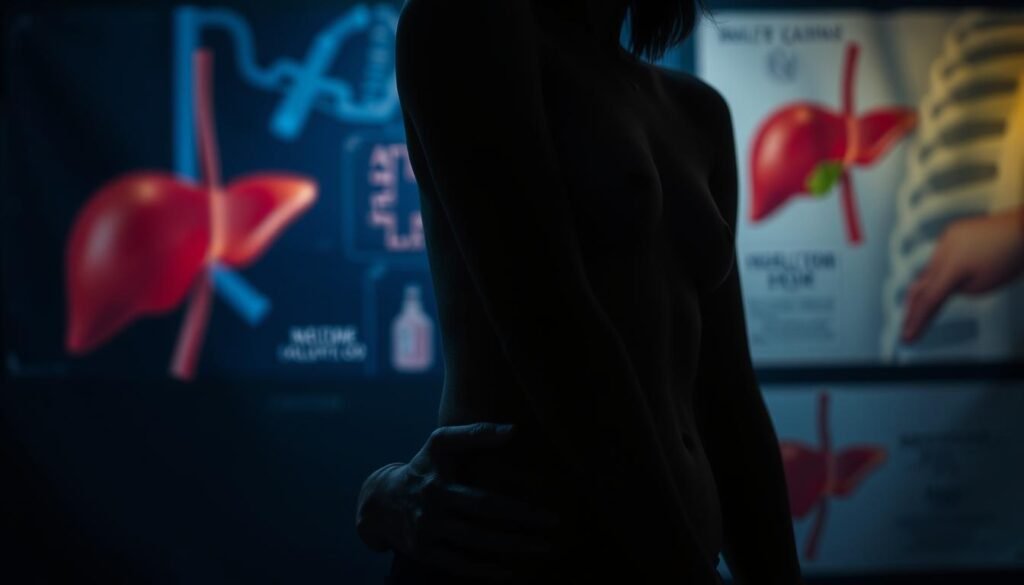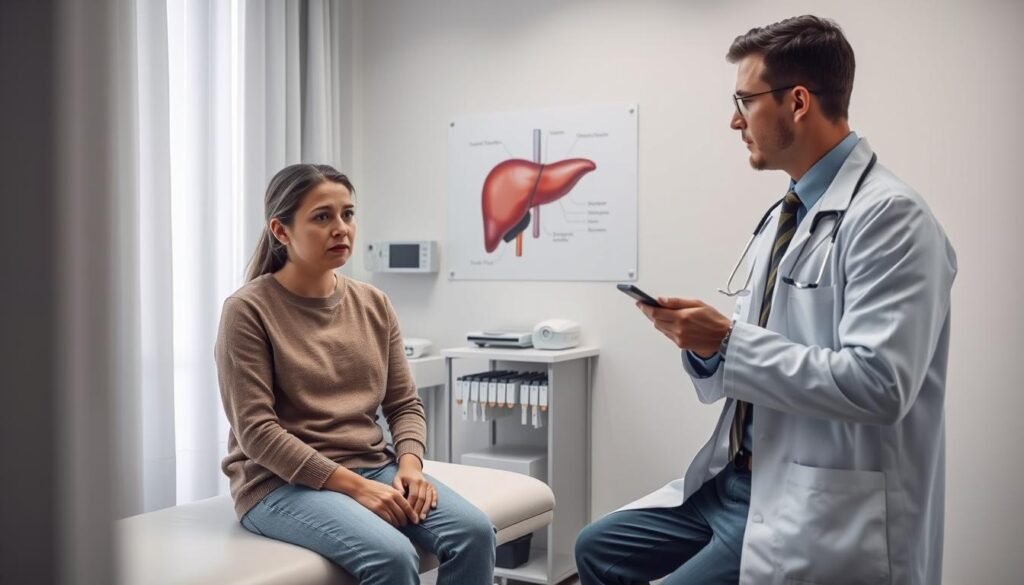In the United States, too much acetaminophen is the top reason people have acute liver failure. This highlights why understanding the warning signs of an enlarged liver matters. An enlarged liver, or hepatomegaly, points to serious health issues beneath the surface. Often, folks don’t know their liver is enlarged until they see major symptoms. This can lead to a delayed diagnosis.
By knowing the symptoms early, individuals can take better care of their health. They can also avoid the severe complications linked with late-stage liver issues.
Key Takeaways
- Acetaminophen overdose is a leading cause of liver failure in the U.S.
- Early detection of hepatomegaly can improve health outcomes.
- Common symptoms of an enlarged liver may remain unnoticed until progression.
- Factors contributing to liver enlargement include diet, alcohol consumption, and certain medications.
- Awareness of liver health can lead to proactive management and lifestyle changes.
Understanding Hepatomegaly
Hepatomegaly is when the liver gets bigger. This condition isn’t a disease itself but a sign of other health issues. The liver is crucial for digestion, metabolism, and cleansing the body of toxins. Normally, an adult liver is about 14 centimeters (5.5 inches) long. If it’s larger, there could be various underlying problems.
Several factors can cause hepatomegaly. These include viral hepatitis, autoimmune diseases, fatty liver disease, and too much alcohol. People who are obese or have type 2 diabetes are more likely to have it. Finding out what’s making the liver big is key. This helps doctors take care of your liver health better.
Doctors often spot an enlarged liver during check-ups. They use ultrasounds to look at its size and structure. Blood tests can show if there’s ongoing liver inflammation. Sometimes, a liver biopsy is done for a close-up look. Knowing why the liver is enlarged is important for treatment. This helps keep you healthy.
Common Causes of an Enlarged Liver
An enlarged liver, or hepatomegaly, can come from different problems. Liver diseases like hepatitis A, B, and C are common causes of enlarged liver. Drinking too much alcohol often leads to a bigger liver. Also, having too much fat in the liver, due to diabetes or obesity, can cause it to enlarge. This includes conditions like nonalcoholic fatty liver disease (NAFLD) and nonalcoholic steatohepatitis (NASH).
Cancer, including leukemia and metastatic tumors, can make the liver bigger too. Heart issues, like congestive heart failure and blockages in the liver’s blood vessels, also contribute. Some people inherit conditions that make their liver large, such as fructose intolerance and glycogen storage diseases.
Certain viral infections and autoimmune diseases can cause liver enlargement too. Knowing about these could help catch liver problems early. This makes treating liver diseases easier.
Symptoms of an Enlarged Liver
A variety of symptoms may show if you have an enlarged liver. These depend on what caused the condition. Knowing the symptoms helps with quick diagnosis and treatment. It’s really important to recognize the signs if you’re at risk of liver disease.
Signs Indicating Liver Disease
Common signs of liver disease include:
- Abdominal pain in the upper right side of your belly.
- Persistent fatigue that makes daily tasks hard.
- Jaundice, making your skin and eyes turn yellow.
- Muscle aches and not feeling well in general.
- Nausea and times when you might throw up.
Non-Specific Symptoms
There are also symptoms that could be seen as signs of other health issues. These include:
- A drop in appetite that leads to losing weight.
- Feeling sick or just not right overall.
- Mood changes, like being irritable or anxious.
If your liver is only a bit larger, you might not notice anything wrong. That’s why regular check-ups with your doctor are key. Often, doctors find liver enlargement during these visits.
Recognizing Abdominal Discomfort
Knowing how your liver feels is key to catching problems early and managing them well. A common sign is abdominal discomfort. This often means there might be something wrong with the liver. When your abdomen swells, it can mess up how you digest food and cause other issues.
This swelling can make you feel really tired. This tiredness can affect your day-to-day life severely. It makes enjoying life much harder.
Understanding Swollen Abdomen
Feeling your belly swollen can be scary. It usually suggests that your liver might be bigger than it should be. Such a big liver can make you feel stuffed or under pressure.
Sometimes, this comes with nausea or pain. Knowing this helps spot liver diseases early. That way, you can get the help you need faster.
Impact of Fatigue on Life
Battling fatigue is common when dealing with liver problems. It really affects how you live each day. Diseases like nonalcoholic fatty liver disease or cirrhosis are often to blame.
This kind of tiredness can stop you from getting stuff done. It even takes away from fun times. That’s why it’s crucial to see how it links to liver health. Getting help is important.
| Symptom | Possible Cause |
|---|---|
| Abdominal Discomfort | Enlarged Liver |
| Swollen Abdomen | Liver Disease |
| Fatigue | Cirrhosis or Nonalcoholic Fatty Liver Disease |
Why Loss of Appetite Matters
The loss of appetite is a key sign of possible liver issues. It can lead a person to eat less than normal. This might cause weight loss and lack of nutrients. Changes in how much you want to eat can link to symptoms of an enlarged liver. It’s important to pay attention to these signs.
When the liver doesn’t work right, one main sign is not wanting to eat. This is a big deal because it could mean there are liver problems that need quick action. Liver disease, inherited liver issues, autoimmune disorders, or infections like hepatitis could be behind it.
If you’re not feeling hungry like usual, it’s critical to check it out with a doctor. Getting help early can help avoid worse liver issues. Taking steps to keep an eye on and prevent liver diseases is key for your health.
Nausea and Vomiting: Common Indicators
Nausea and vomiting often signal liver health issues, especially in those with liver disease. These uncomfortable symptoms can lessen quality of life. They may lead to problems like dehydration if ignored. Causes include constipation, ascites, bad reactions to medicine, and infections. Knowing these causes is key for getting the right help fast.
For cirrhosis sufferers, ongoing nausea and vomiting can indicate bigger problems. For example, belly swelling might make digestion harder, making symptoms worse. Watching these signs closely is important. When nausea causes dehydration, the situation can worsen fast. Catching these symptoms early helps manage them better and might lessen their impact.

Trying home remedies can offer some relief. Drinking tiny amounts of liquids, eating less but more often, adding ginger to your diet, and avoiding fatty or spicy food can help. But it’s important to know that if vomiting continues for over 24 hours, if there are changes in how alert you feel, or if you throw up blood, you must seek medical help right away. These could be signs of serious problems.
The Significance of Jaundice
Jaundice shows when there’s something wrong with the liver, by turning the skin and eyes yellow. This happens because of too much bilirubin in the blood. It often points to liver damage or problems with bile flow. If bilirubin in the blood goes over 1 mg/dl and reaches 3 mg/dl, the yellowing is easy to see.
It’s important to understand jaundice, especially with other liver problem signs. Severe liver diseases can cause nausea, vomiting, pain in the belly, and noticeable veins on the skin. These signs mean one should seek medical help right away. If not treated, liver issues can get really bad, leading to ascites, bleeding problems, or brain issues.
About 60% of newborns get jaundice because their livers are not fully developed. Too much bilirubin can harm the brain. This is why parents need to check their babies for jaundice in their first week. Catching and treating it early helps avoid serious health problems later.
Seeing a yellowish tone on the skin can worry someone. Yet, it’s key to know the difference between jaundice and other reasons for skin color changes. For example, eating a lot of beta-carotene-rich foods like carrots causes a harmless yellowing. Knowing this helps in recognizing jaundice and understanding what it means for health.
Identifying Unexplained Weight Loss
Unexplained weight loss is a big health worry, especially with liver disease signs. The liver is key in metabolism. Poor liver function can mess up metabolism, leading to unintentional weight loss. This is often a sign of liver problems.
If you lose weight and have other liver disease signs, like stomach pain, being very tired, or jaundice, get checked out. Medical advice can pinpoint the cause. It’s important to know that unexplained weight loss might be due to fatty liver disease. This condition can get worse without quick help. A doctor can spot issues like a liver disease tied to heart and blood sugar risks.
Factors like being overweight or drinking too much alcohol can harm your liver. Watching weight changes helps catch liver problems early. If you or someone else has a lot of weight loss without trying, plus other worrying signs, see a doctor.

Swollen Legs as a Warning Sign
Swollen legs often tell us something is wrong, especially with the liver. The liver helps balance fluids. If it’s not working well, you might get swollen legs. This is a key sign that we shouldn’t ignore.
About 20–30% of people could have fatty liver disease. It’s a silent issue because many don’t see symptoms early on. Swelling in the legs and belly, or feeling more tired, are signs. If you see these, it’s time to see a doctor without delay.
Eating poorly, not moving enough, and some meds can make swelling worse. Heart and kidney problems can also cause it. Our health is all connected. That’s why we should not ignore swollen legs.
Want to avoid liver problems? Eat right and stay active. This can lower your risk. If you’re worried about liver health, check out early signs and symptoms of liver disease for help.
When to See a Doctor
Knowing when to see a doctor for liver issues is vital. A quick doctor’s visit can make a big difference. It can help catch diseases early and avoid serious problems.
Importance of Early Diagnosis
Don’t wait to get help if you notice liver symptoms. Early signs can be easy to miss. But ignoring them might lead to big health issues, like liver failure.
Seeing your doctor regularly helps catch problems early. It’s key to managing your health well.
Emergency Symptoms to Watch For
If you have any of these symptoms, get help right away:
- Severe abdominal pain
- Jaundice accompanied by fever
- Unusual bleeding or bruising
- Extreme fatigue or confusion
- Vomiting blood or dark stools
These signs could mean something serious, like liver cancer. Acting fast can save your life and stop things from getting worse.

Diagnostic Tests for Enlarged Liver
Doctors start by checking your body and doing diagnostic tests to find an enlarged liver. They often do blood tests first. These liver function tests check the stuff your liver makes. High levels of certain enzymes can show liver problems or diseases like nonalcoholic fatty liver disease (NAFLD).
Imaging studies are also key in finding what causes a big liver. Techniques like ultrasound, CT scans, and MRI look for fat in the liver and check for weird shapes. A newer method called elastography measures liver stiffness. This can show if there’s fibrosis.
Sometimes, doctors suggest a liver biopsy to confirm diseases like nonalcoholic steatohepatitis (NASH). This test directly looks at liver tissue to see how bad the disease is. Talking to a healthcare provider helps you understand these tests. Consult a healthcare provider about your liver health.
Treatment Options for Enlarged Liver Conditions
People with an enlarged liver must learn about their treatment options. These treatments focus on the root cause and often include liver health management. Targeted therapies play a big part in this process.
Taking medications is key for treating some liver diseases. These drugs fight off viruses like hepatitis and lower inflammation in fatty liver disease. Stopping alcohol use is essential for those whose liver problems come from drinking.
Making lifestyle changes is also important. Eating a balanced diet and exercising regularly can improve liver health. This approach is proactive and centers on managing liver health well.
In extreme cases, surgery might be needed. A liver transplant is considered when there’s severe liver failure or cirrhosis. This highlights the importance of catching liver issues early and being under a doctor’s care.
With liver diseases affecting millions in the U.S., professional advice is crucial. Treating the underlying issues improves life quality for those with enlarged liver conditions.
| Condition | Treatment Options |
|---|---|
| Fatty Liver Disease | Dietary changes, exercise, medications |
| Alcoholic Liver Disease | Abstinence from alcohol, nutritional support |
| Hepatitis (A, B, C) | Antiviral medications, lifestyle adjustments |
| Liver Cirrhosis | Liver transplant, symptomatic care |
| Toxic Hepatitis | Immediate cessation of harmful substances |
Preventing Liver Enlargement
To stop liver enlargement, choose a healthy lifestyle. Eat a balanced diet with lots of fruits, veggies, grains, and lean proteins. Healthy eating lowers your risk of getting liver disease.
Working out is key to staying healthy. It helps keep your weight in check and your liver working well. Try to exercise for at least 150 minutes every week.
Drinking less alcohol is crucial. Too much can harm your liver, causing conditions like hepatitis and cirrhosis. Even a little alcohol can be bad if you drink often.
Stay away from harmful substances, like some drugs and medications. They can make your liver bigger. Always talk to your doctor before trying new medicines.
Go for regular doctor visits. They can spot and treat liver problems early. This can stop bigger health issues later.
Here are some lifestyle tips for a better liver:
| Health Tip | Impact on Liver Health |
|---|---|
| Balanced Diet | Nourishes the liver and helps regulate fat accumulation. |
| Regular Exercise | Improves metabolism and reduces risk of fatty liver. |
| Limit Alcohol | Reduces risk of liver inflammation and cirrhosis. |
| Avoid Harmful Substances | Prevents drug-induced liver injury. |
| Regular Check-Ups | Allows for early detection and management of liver conditions. |
Conclusion
It’s vital to know about liver health to stay overall healthy. Spotting signs of liver problems is key. An enlarged liver might mean liver disease, heart failure, or cancer. Knowing these signs—like belly pain, feeling very tired, throwing up, and yellow skin—helps a lot. Quick action upon noticing these symptoms is crucial for good management and treatment.
Lots of things can cause an enlarged liver. This includes liver issues like cirrhosis and hepatitis, and cancers such as liver cancer and lymphoma. Drinking too much alcohol and bad eating habits can up the risk of liver problems. Making good life choices can help lower these risks. This improves your liver health knowledge.
Getting medical help early when seeing symptoms is super important. Treatment mainly tries to fix the main problem. It might include changing how you live, taking medicines, or surgery options. In tough cases, like with liver cancer, a transplant might be needed. Knowing about this helps with quick help, which supports better liver health. This cuts down the chance of big health issues.